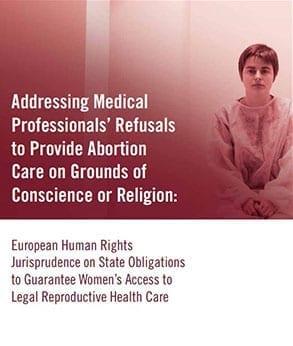New Study Suggests Many Women Refugees from Ukraine are Returning Home Temporarily to Access Essential Reproductive Healthcare as a Result of Barriers in Parts of the EU
Some refugees in Hungary, Poland, Romania and Slovakia are returning to Ukraine temporarily to access abortion, contraception and other reproductive health services. New fact-finding study underlines urgent need for action by national governments, the European Union, and the humanitarian and donor community.
16.05.23 (PRESS RELEASE) Geneva – Women from Ukraine who sought sanctuary in the European Union often experience a series of entrenched barriers when seeking access to sexual and reproductive healthcare and gender-based violence support in Hungary, Poland, Romania and Slovakia.
A new study released today by a collective of nine national and international human rights organizations, entitled Care in Crisis: Failures to guarantee the sexual and reproductive health and rights of refugees from Ukraine in Hungary, Poland, Romania and Slovakia, documents the alarming impact that multiple intersecting barriers in access to good quality sexual and reproductive healthcare are having on refugees from Ukraine in Hungary, Poland, Romania and Slovakia. As a consequence of these obstacles, some refugees are returning to Ukraine temporarily to access essential reproductive healthcare, accessing care outside of legal pathways or going without much-needed care entirely, according to the report.
The report is based on more than 80 semi structured interviews with refugees, professional stakeholders, and experts in Hungary, Poland, Romania and Slovakia conducted between July 2022 and April 2023. The report outlines that many refugees from Ukraine who seek healthcare such as contraception, abortion care and maternal healthcare are exposed to harmful delays, anxiety and fear, financial burdens, institutional racism, and sub-standard care with direct consequences for their health and well-being.
“The European Union has promised to provide refugees from Ukraine with sanctuary and care. Yet women from Ukraine who are now in Hungary, Poland, Romania and Slovakia often experience a very different reality when they need sexual and reproductive healthcare. Instead of care and protection, they regularly face an obstacle course of restrictions, confusion, stigma and discrimination,” said Leah Hoctor, Senior Regional Director for Europe for the Center for Reproductive Rights. “The health and wellbeing of some refugees from Ukraine is being placed at risk because of failures to guarantee access to essential and time-sensitive healthcare and support services, compounding the harm they have endured as a result of the invasion of Ukraine.”
Hungary, Poland, Romania and Slovakia, are some of the most restrictive environments in Europe for sexual and reproductive health and rights and gender-based violence support services. As outlined in the report, the barriers the refugees from Ukraine are facing include legal restrictions, cost barriers, information shortfalls, poor quality care and lack of basic services.
The report also examines the grave challenges experienced by civil society organizations and women human rights defenders in Hungary, Poland, Romania and Slovakia who are providing critical assistance to refugees from Ukraine. Many of them are grappling with serious threats, intimidation and harassment as well as financial and operational uncertainty in contexts where sexual and reproductive rights are not priorities for the state.
The report outlines a series of urgent actions that the European Union, national governments and humanitarian actors must now take to address these findings.
Key Findings from the Report:
- Many refugees feel that they have no choice but to return to Ukraine temporarily if they need sexual and reproductive healthcare.
- Because of the numerous barriers to care, many refugees postpone seeking sexual and reproductive healthcare for as long as possible. These delays can put their health at risk.
- Most refugees in Poland—where abortion is illegal under most circumstances—are forced to seek abortion care outside of legal pathways by obtaining abortion medication online or traveling to other EU member states to access care.
- Survivors of gender-based violence often go without basic services and support and are dealing with trauma, health concerns and other consequences on their own.
- Certain groups of refugees—particularly Roma women and LGBTQ+ refugees—face intersectional discrimination and increased barriers.
- When care is obtained, it is often only due to assistance from NGOs and human rights defenders.
Read the full report: Care in Crisis: Failures to guarantee the sexual and reproductive health and rights of refugees from Ukraine in Hungary, Poland, Romania and Slovakia
“The results of this fact-finding confirm what we see every day working with refugees from Ukraine in Romania: women and girls who have been forced to flee their homes in the midst of war are devastated to find themselves cut off from good quality care when they need it most,” said Irina Mateescu, AMI, Romania
“Gender stereotypes and multiple discrimination are combining with rising backlash against sexual and reproductive rights and gender equality, to jeopardise access to good quality healthcare and support services for women and girls in Romania. Vulnerable groups always have the hardest time navigating these stormy waters,” said Camelia Proca, A.L.E.G., Romania
“Roma refugees from Ukraine are treated with such biases and double standards, being denied simple emergency services or basic products. In addition to the barriers faced by all women who need access to sexual and reproductive healthcare, they face institutional racism, sexism and classism. They are segregated in some shelters, or discouraged to address services,” said Carmen Gheorghe, E-Romnja, Romania
“Slovakia does not have the necessary services in place to respond to the needs of women from Ukraine. Whether it comes to abortion care, contraception services, gender-based violence support so much is lacking. There are so many barriers in their way,” said Adriana Mesochoritisova, Freedom of Choice, Slovakia
“There is an almost total ban on access to abortion care in Poland. Decision makers in Poland have failed not only Polish women but also women from Ukraine who need legal abortion care. The fact that refugees from Ukraine in Poland are forced to return to Ukraine for abortion care or to access care in other parts of Europe is an indictment of Polish law and practice,” said Krystyna Kacpura, Foundation for Women and Family Planning, Poland
“Following the invasion, human rights organizations mobilized immediately to respond to the needs of refugees fleeing Ukraine,” said Erika Schmidt, EMMA Association, Hungary. “But, one year on, we and other organizations providing sexual and reproductive care continue to run up against major legal, financial and operational challenges that impact our ability to serve refugees.”
“The humanitarian response has not provided enough support to the efforts of civil society organizations at the front lines in Romania and other Central European countries and our organizations continue to face so many challenges,” said Andrada Cilibiu, Filia Center, Romania
“Support services for survivors of sexual and gender-based violence in Poland are entirely inadequate. So many survivors find no safe haven where they can be supported in addressing the traumatic experiences they have endured,” said Joanna Piotrowska, Feminoteka Foundation, Poland
Background
The full-scale invasion of Ukraine by the Russian Federation in February 2022 has forced more than 8 million people—mostly women and children—to seek refuge in countries throughout Europe. The invasion is continuing to bring devastating consequences for the people of Ukraine, including widespread human rights violations, gender-based crimes and conflict-related sexual violence.
The fact-finding was undertaken by a collective of nine women’s rights, human rights, sexual and reproductive health and rights (SRHR) and gender-based violence (GBV) organizations working in Hungary, Romania, Poland Slovakia, the European region and internationally. They include: the Center for Reproductive Rights (International); EMMA Association (Hungary); E-ROMNJA (Romania); FEDERA (Poland); FEMINOTEKA (Poland); Freedom of Choice (Slovakia); FILIA Center (Romania); ALEG; and Independent Midwives Association (Romania).
###
Media Contact:
Center for Reproductive Rights: [email protected]


